Online Marketplace Industry
While the marketplace was once a catalyst for city development, today it serves as the lifeblood of businesses and companies worldwide. It has transformed from a local hub to a global force, energising enterprises on a global scale.
In 2028, the e-commerce market is anticipated to reach an impressive US$5,02 trillion, showing a strong compound annual growth rate (CAGR) of 10.15%. Projections point to a remarkable rise in marketplace development trends, establishing e-commerce as the predominant global retail channel.
In today’s digital market, it’s not just about buying physical products – services are also in high demand. Consider platforms like Uber, Booking and Fiverr, which have transformed the market by providing great opportunities for sharing and earning.
While most of the sectors may have established leaders, it doesn’t mean your marketplace idea won’t succeed. It just means you need to put in extra effort, offer something truly unique, and capture the customer’s interest!
As technology evolves, the e-commerce marketplace keeps changing. To stay ahead, it’s important to understand these dynamic trends, ranging from web development services to unique customers’ preferences, dictating the future of the industry.
This article is your guide to the top 10 marketplace trends in 2024. Let’s explore!
10 Key Marketplace Development Trends to Watch in 2024
1. Mobile Shopping
The widespread use of mobile devices has significantly influenced the world of e-commerce, and this impact is expected to continue shaping the industry in 2024.
Globally, more and more people are using their mobile phones to shop online. According to Statista, mobile e-commerce sales will soar to an impressive US$2.2 trillion by the end of 2023, constituting 60% of all global e-commerce purchases.
The growth in mobile online sales is projected to reach US$3.4 trillion in 2027.
As mobile devices evolve faster than traditional computers, savvy business owners must prioritise a mobile-first design in their marketplace software development.
This means focusing on adaptive or responsive design to provide users with a high-quality experience.
Additionally, incorporating Google AMP technology can boost search engine rankings. By embracing these trends, businesses not only stay ahead in the competitive market but also boost online visibility.
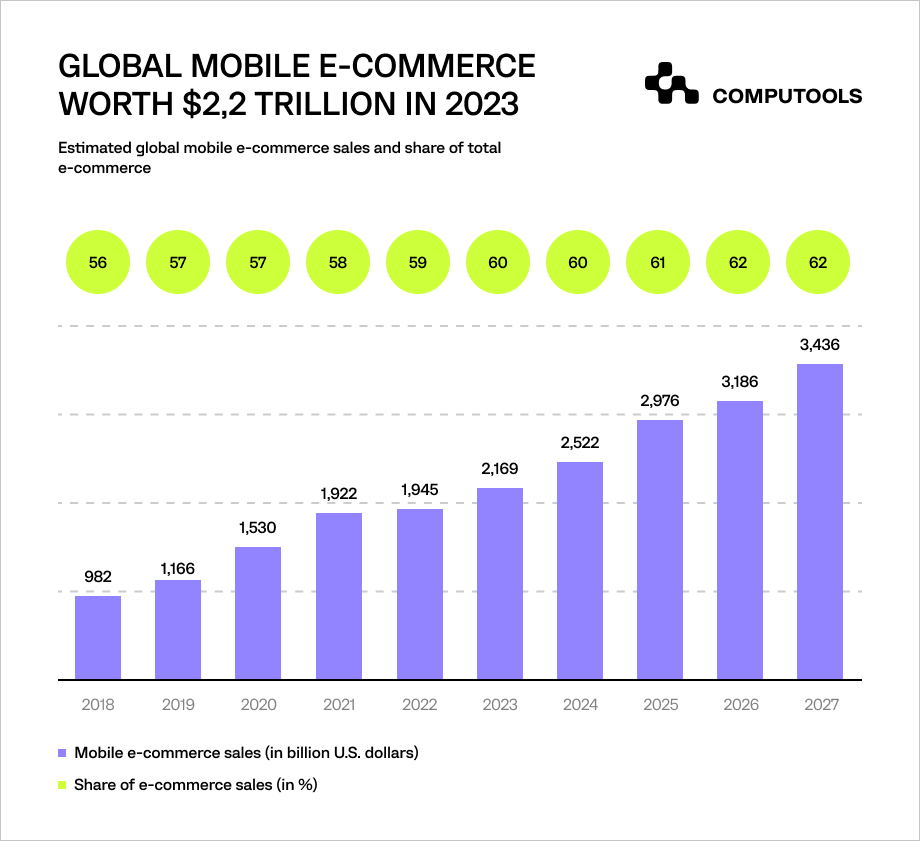
2. Buy Online, Pick Up In-Store (BOPIS)
The BOPIS approach to e-commerce, which gained popularity during the COVID-19 pandemic, allows customers to purchase items online and collect them at physical stores.
As stated by ResearchAndMarkets, this convenient shopping trend is expected to persist in the future, with the global BOPIS market projected to reach US$703.18 billion by 2027, growing at a rate of 19.3% annually.
BOPIS offers several benefits, such as eliminating shipping charges, providing quick in-store product retrieval, ensuring product availability, and promptly addressing delivery issues.
Major retailers like Zara, Walmart and Target have implemented this model in their business practices.
Target, in particular, has elevated the BOPIS experience with its innovative “Drive Up” feature, using a dedicated app to ensure efficient order processing and swift delivery to customers’ cars in the store car park, reducing wait times and enhancing overall convenience.
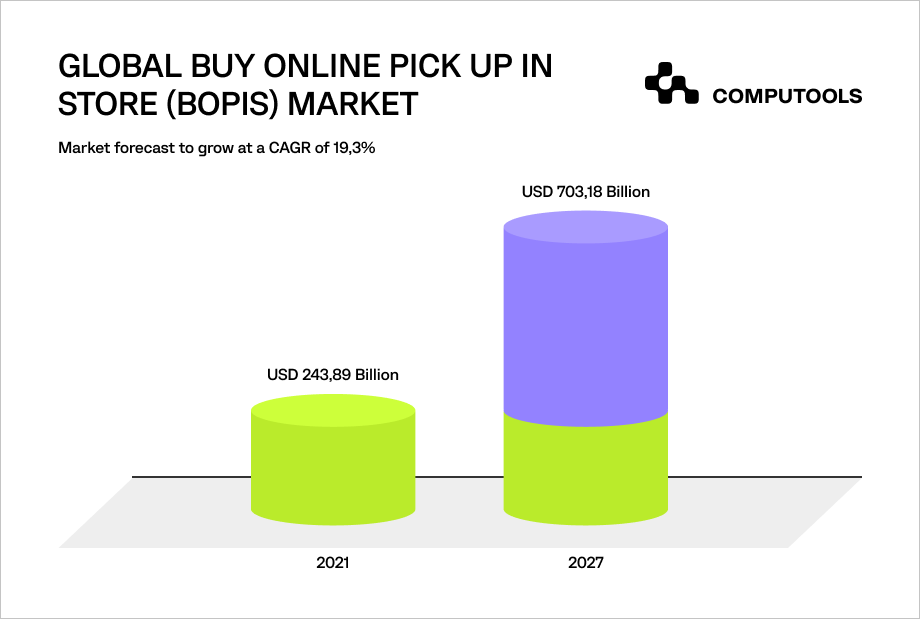
3. Hyper-Personalisation
Whether dealing with businesses or individual customers, people value personalised online shopping experiences.
This means tailoring unique offers, messages and loyalty-building features like customer recommendations, promotions, discounts, coupons, and offering various payment methods for convenience.
The key to success lies in customising every part of your approach to engage customers.
For example, imagine a customer receiving personalised product recommendations based on their browsing history or enjoying exclusive discounts tailored to their preferences.
This way you’re creating a user experience where users feel a one-to-one connection with the platform, ensuring your custom e-commerce solutions excel in 2024.
4. Diverse Payment Options
In 2022, digital wallets took the lead in global e-commerce transactions, constituting around 50% of payments. Projections suggest this dominance will grow to over 54% by 2026. Meanwhile, credit cards are expected to decline in the coming years.
To enhance the online shopping experience, it’s important to offer customers various payment options. In addition to traditional cards, consider incorporating widely used platforms like Google Pay, Apple Pay, and PayPal, aligning with the growing online marketplace trends.
A smooth and efficient experience can significantly boost your conversion rates.
Embracing cryptocurrency and blockchain technology as a payment method is also a forward-thinking move, given its benefits of low transaction fees and heightened security.
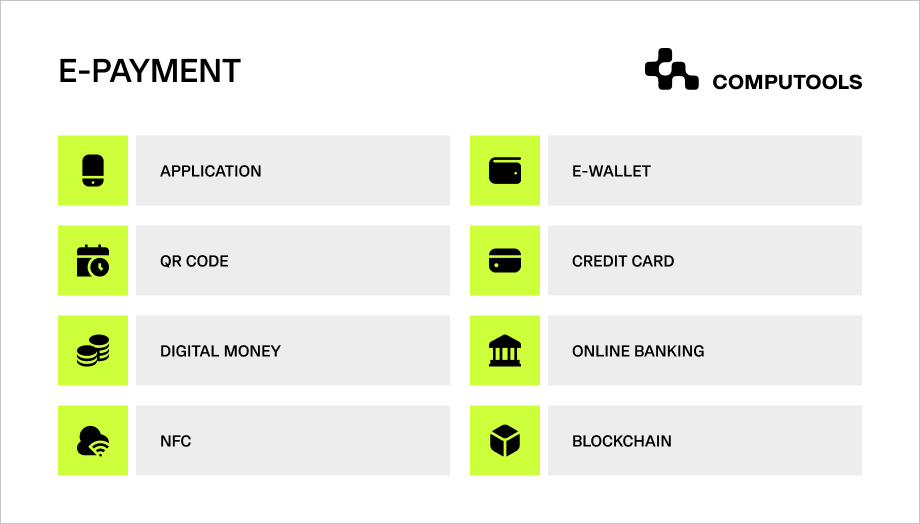
5. Interactive Chatbots
The primary driving force behind e-commerce sales comes from Zoomers and Millennials, particularly those aged 18 to 34.
These generations prefer instant messengers over phone calls, making it important to leverage marketplace trends like messengers and chatbots for communication.
Chatbots are in high demand, offering a transformative customer experience.
They analyse customer queries and provide pre-packaged responses, acting as virtual shopping assistants, answering questions, suggesting purchases and streamlining the shopping process, especially when customers are occupied with other activities.
Sophisticated chatbots go beyond simple interactions, handling complex conversations and responses. Their evolving capabilities highlight their huge role in shaping the future of online marketplace development in 2024.
6. Subscription Services
In a recent survey conducted by Vaimo, a noteworthy 23% of respondents committed to continuing their reliance on subscription services – a substantial 7-percentage point surge from the previous year.
Millennials and Zoomers make up about half of this dedicated audience, with Millennials witnessing a 16-percentage point growth compared to the last year.
Retailers can leverage subscription models across diverse product categories, spanning beauty products, clothing, pet supplies and more.
This not only offers customers a convenient and personalised online shopping experience but also cultivates customer loyalty and bolsters revenue streams.
For instance, leading beauty brands like Glossier and Birchbox have successfully implemented subscription services, allowing customers to receive curated products regularly.
Similarly, companies like Stitch Fix have embraced personalised clothing subscriptions, tailoring fashion choices to individual preferences and highlighting the versatility of the subscription model approach.
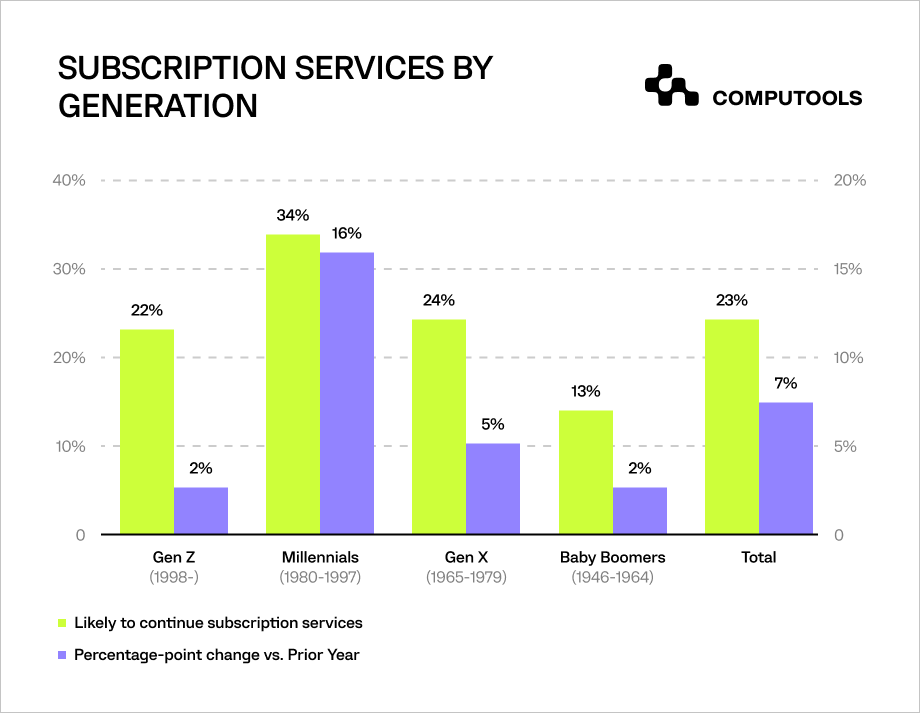
7. Voice Commerce
In today’s tech world, voice assistants like Amazon Echo and Siri have become must-have tools. Recent projections suggest that a whopping 75% of US households will have smart speakers by 2025.
The rising popularity of Siri, Google Assistant and Alexa is driving the growth of voice commerce. To stay competitive, it’s crucial to add an implementation of voice search to your e-commerce software development strategy.
Given the local focus of voice searches, prioritise optimising your business for local discoverability.
Make sure essential details like business name, physical address, email and phone number are up to date for better local search performance.
Also, recognise the differences between voice search assistants. Tailor your optimisation strategy for each assistant’s unique algorithms, ensuring your e-commerce platform is well prepared for the dynamic changes in the marketplace industry.
Learn more about marketplace development trends
Contact us →8. Augmented Reality
In the ever-evolving world of online shopping, augmented reality is changing the game, as highlighted in insights from the Snap Consumer AR Report.
The study reveals that consumers are actively reshaping their digital experiences through AR, using its unique ability to customise products and provide a comprehensive understanding of a product’s effectiveness from every angle.
Statistics also claim that Zoomers and Millennials are 71% more likely to regularly use AR compared to older generations. Still, most of the older customers see AR as a practical tool.
Leading companies are already transforming the online shopping experience through AR. For instance, IKEA allows customers to use AR to preview how furniture will look in their homes before making a purchase.
As technology continues to advance, businesses strategically incorporating AR into their e-commerce approaches are creating more engaging and immersive online shopping experiences.
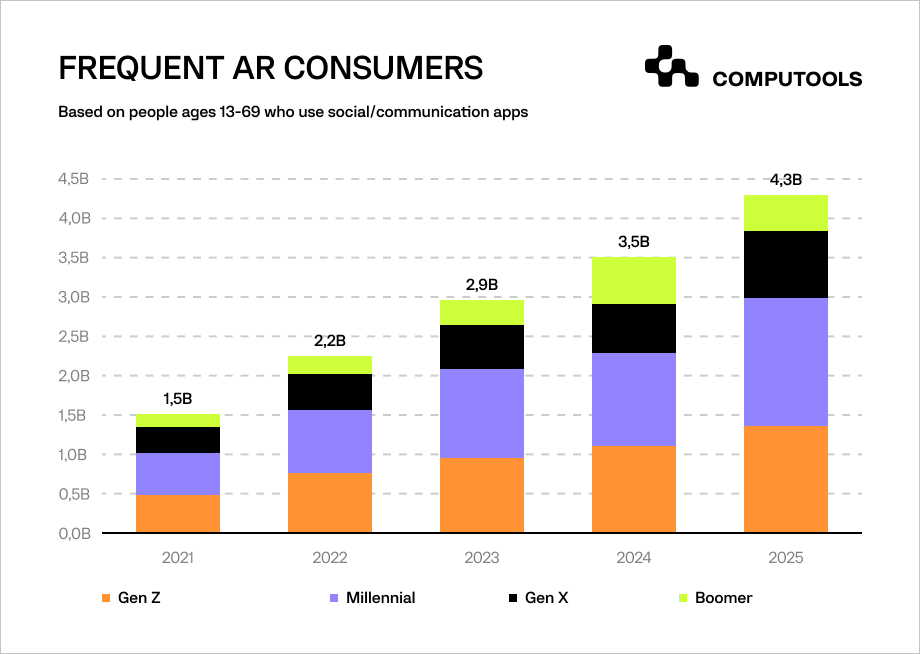
9. Vertical Marketplaces
Another significant trend in online marketplaces is the rise of vertical e-commerce platforms. Unlike broader horizontal multi-vendor marketplaces that offer a variety of products, vertical marketplaces focus on specific niches and cater to a particular category of items.
This shift reflects a strategic decision by business owners to narrow their focus and target a more specific group of customers.
If you’re considering venturing into marketplace development, building a vertical platform could be a smart move, allowing you to carve out a unique space in the competitive market.
This focused approach helps your platform stand out and attract a specific customer base.
Think about it this way: replicating another Amazon may not be the most appealing to users. On the other hand, vertical platforms, such as Houssn or LiquidSpace, bring added value by addressing unique needs and requirements.
10. Social Media Marketplaces
In the upcoming year, we’re expecting a notable change in how businesses operate at the intersection of social media and commerce.
Social commerce, which involves directly selling products on social media platforms, is gaining popularity and is predicted to become an even more widespread practice among online marketplace trends in 2024.
The social marketplace method simplifies the online shopping process, allowing customers to make purchases without leaving their favourite social media platform.
Interestingly, this trend is especially popular among younger consumers, suggesting it will continue to grow rapidly in the coming year.
The Future of the Online Marketplace Industry: What to Expect?
What can we expect in the realm of marketplace development trends over the next few years? The e-commerce landscape will evolve due to an increased demand for digital sales and a growing number of businesses entering the online marketplace.
First of all, businesses should be prepared for a rapid digital transformation involving further development of augmented reality, voice and image search.
Simultaneously, global uncertainties resulting from the pandemic aftermath, geopolitical events, and various economic and cultural challenges are also significant factors that will hugely influence the industry.
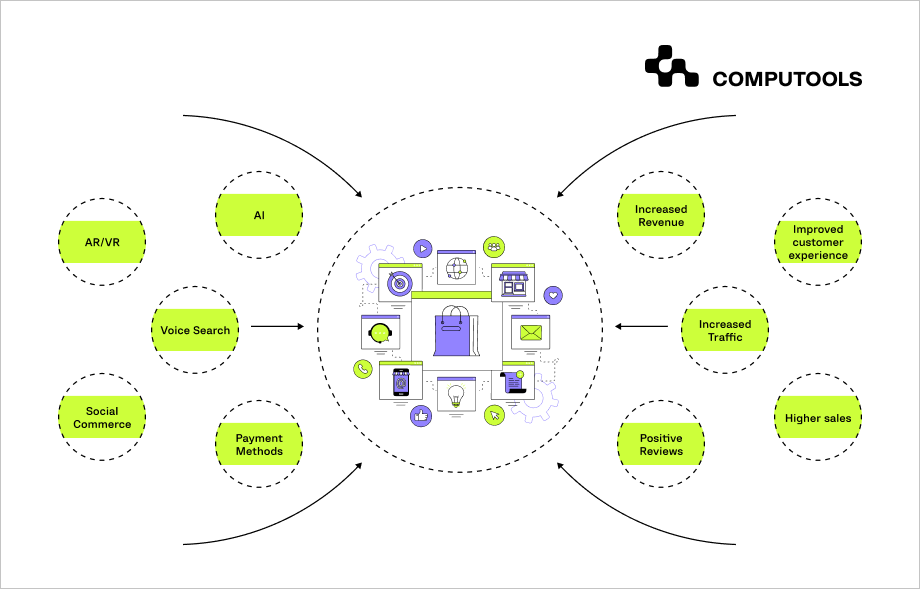
Companies also shouldn’t forget about the growing trend of green technologies connected to the development of green policies, such as the European Green Deal, Net-zero Emissions Procurement and many others currently developing in different countries.
Modern consumers, mostly composed of Millennials and Gen Z shoppers, increasingly prioritise eco-friendly products, with 65% expressing a preference for brands committed to sustainability. To stay ahead in the market, brands must align with this growing online marketplace trend.
Another notable change is customer behaviour, now focusing on seamless user experiences, quick deliveries, easy returns and mobile-first web designs.
The emergence of integrating online stores with social networks is also expected to be a game-changer, enabling marketplaces to leverage platforms like TikTok, Instagram and Facebook for engaging shoppable video ads.
Final Thoughts
In the fast-paced realm of online marketplaces, businesses can tap into a wealth of benefits for boosting revenue and sales.
Yet, with the industry constantly changing due to recent trends, stepping into the realm of creating your e-commerce marketplace platform can be daunting.
If you lack expertise in online development, it’s important to partner with specialists who bring the right skills and experience to the table.
Seek professionals capable not only of grasping the nuances of the ever-changing marketplace but also of guiding you toward establishing a vibrant and successful commercial presence.
Schedule a meeting with Computools’ specialists by contacting info@computools.com and join forces to drive innovation together.









Computools was selected through an RFP process. They were shortlisted and selected from between 5 other suppliers. Computools has worked thoroughly and timely to solve all security issues and launch as agreed. Their expertise is impressive.